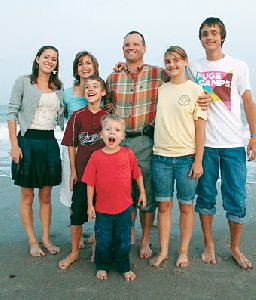CAMP LEJEUNE, N.C.—Sitting around the kitchen table, the Riverses are a picture of the quintessential American family. Over a freshly prepared meal, they share stories of the day's events. The room is filled with the warmth of smiles, laughter and genuine compassion for each other.

Chaplain Ray Rivers and his wife, Paula, enjoy having their entire family reunited since Rivers returned from deployment in Afghanistan and Iraq. But they also found they had to reconfigure family roles and make adjustments.
|
But it wasn't that long ago one significant piece of this portrait—the family's patriarch, Ray Rivers—was absent, as he served tours of duty in Afghanistan and Iraq as a Baptist General Convention of Texas-endorsed chaplain. His deployment in 2008 and 2009 forced the family to adjust.
Other churches are less formal about the way they seek to minister to military families. They rely on the church body to reach out to military members and their families as they would any other person in the community. Sunday school classes, Woman's Missionary Union of Texas groups and others within the congregation routinely pray for specific needs.
Making an impact
To make a more direct impact, churches can contact their local bases, armories or chaplains, Mackrell said. The military holds Christmas celebrations and donation drives to gather personal items for specific soldiers. Chaplains often can provide specific points of need churches can fill. Recently, Mackrell connected a church with a soldier who returned from deployment only to see his Bastrop-area home had burned. The church provided supplies for the soldier and his wife.
"Churches could increase their attendance just by reaching out to soldiers," Mackrell said. "When they come back, half of them are asking serious questions."
First Baptist Church in San Antonio provides meals periodically for military personnel and their families through the Fisher Houses, located at military medical centers to provide a free place for military families to stay while their loved ones receive care, and the Warrior and Family Center at San Antonio Military Medical Center.
The meals are a way for First Baptist Church to show servicemen and women that the congregation cares about them, said Charlotte Anderson, who coordinates the effort and also volunteers to help the chaplain at Brooke Army Medical Center. People are in the houses for short periods of time at crucial moments, and the meals give families one less task they have to worry about.
Church members prepare and serve the meals. They often have an opportunity to visit with some of the people who come to eat as well. People share about injuries suffered by their sons. Mothers have spoken about a son's losing battle with cancer.
In serving military members and their families as well as working the chaplain, Anderson seeks to help however she can. When First Baptist Church members discover ways they can help military personnel, they are eager to get involved. One ministry opportunity often leads to another.
"We just kind of keep our eyes and ears open and try to meet needs," Anderson said.
A message of hope
First Baptist Church in Glen Rose took a different approach to serving military personnel—starting a support group for veterans led by veterans within the congregation. The church attempted to create a safe environment where veterans could talk about issues they were going through. The gatherings were held on Wednesday nights. After trying for a while, the congregation stopped holding the classes due to lack of attendance.
No matter how congregations approach ministry to veterans, Riza believes it's vital. People such as veterans who have seen some of the darker aspects of life need to hear a word of encouragement and have the opportunity to ground their lives in the love of Christ, he said. Without Christ, their post-war struggles are much more difficult to survive.
"Church can give a message of hope," Riza said. "That's the one piece of advice I would give."
